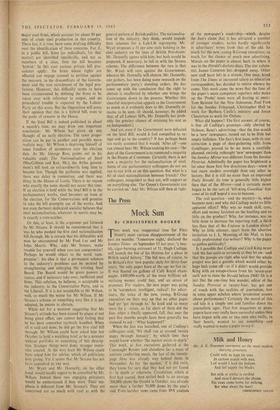The Press
Mock Sun
By CHRISTOPHER BOOKER
HIS week was reappraisal time for Fleet I Street's most curious disappointment of the
past six months. 'Tomorrow night,' declared the
Sunday Tittles on September 13 last year, 'a boy- ish, cigar-burning extrovert of 51, Hugh Cudlipp, will launch the bid of his lifetime for a place in British social history.' The bid was, of course, to be Britain's first 'new popular daily for thirty-four years, 'the only paper born of the age we live in.' It was floated on gallons of Cafd Royal cham- pagne, £400,000-worth of the most brilliant ad- vertising money could buy, and an ocean of promises. For readers, the new paper was going to be 'outspoken, intelligent, radical'; for adver- tisers, the voice of the new, young, 13-Group executives on their way up that no other paper had yet 'got through to.' So loud and so many were the r ,raises, so far short of them did the Sun, when it finally appeared, fall, that over the past five months people have been generally too stunned to ask—'What happened?'
When the Sun was launched, one of Cudlipp's colleagues said, 'We shall run at around twenty pages through January'; by which time they would know whether 'the market exists in depth.' This week, as Sun executives gathered at the Connaught Rooms and elsewhere for a mass of anxious conferring meals, the last of the twenty- page ans was already way behind them. in November. As for 'the market,' if it did exist, they knew for sure that they had not yet found it—in depth or otherwise. Circulation, which at first had soared, then settled back to an average 200,000 above the Herald in October. was already more than a further 50,000 down by the year's end. Even harsher news came from IPA analysis of the newspaper's readership—which, despite the Sun's claim that it has attracted a number of younger readers, varies hardly significantly in advertisers' terms from that of the old. So much for the new, young B-Group executives; so much for the chance of much new advertising. Morale on the paper is almost back to where it was in the Herald's darkest days. The star colum- nist James Cameron has dropped away. Other new staff have left in a stream. One man, hired from The Times at increased salary as education correspondent, has decided to return whence he came. This week came the news that the four of the paper's more competent reporters who make up the 'Probe' team were all leaving at once: Tom Baistow for the New Statesman, Paul Foot for the Sunday Telegraph, Christopher Hall to work for Barbara Castle's ministry and Joyce Chesterton to work for Oxfam.
What did happen? The first answer, of course, is that all Cudlipp's promises—ably abetted by Hobson, Bates's advertising—that the Sun would be a 'new' newspaper, turned out to be little but empty ballyhoo. The Sun's first issue, with its star attraction a page of dust-gathering stills from Goldfinger, proved to be no more a carefully planned, entirely rethought 'new' newspaper than the Sunday Mirror was different from the Sunday Pictorial. Admittedly the paper has brightened a lot since those first few disastrous days—when it lost more readers overnight than any other in history. But it is still no more than an improved Daily Herald, its tone is generally little higher than that of the Mirror—and it certainly never began to be the sort of left-wing Guardian' that some of its staff hoped it was to become.
The real question—and the mystery—is, what happens now; and why did Cudlipp make so little apparent effort? Why was so much skill, care, effort and money lavished on the hustling and so little on the product? Why, for instance, was so little done to increase the reporting staff, a third less than that of the Express in London alone? Why so little attempt, apart from the abortive invitation to J. L. Manning of the Mail, to hire really professional star-writers? Why is the paper so gutless politically?
Is it possible that Cudlipp and Cecil King never took the Sun quite as seriously as they let on—and that the gossips are right who said that the whole project was just a gamble which would either by huge luck come off—or if it didn't would provide King with an escape-clause from his 'seven-year oath' not to close the Herald before 1968? Or is it just that the one-time boy wonder, editor of the Sunday Pictorial at twenty-four, has got out of touch with the realities of journalism, lost in some upper echelon where 'projection' counts above performance? Certainly the moral of this sad tale is a simple one and familiar down the journalistic ages. That few magazines or news- papers have ever really been successful unless they have begun with one or two men who really, in their hearts, wanted to say something--and really wanted to make a paper to say it.


































 Previous page
Previous page